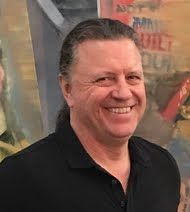Thinking About Peace and Painting With Melissa Pickford
 |
| Under the Gun Film Poster Reflected in Window at Premiere in Beverly Hills, CA May 3, 2016 photo by Gregg Chadwick |
Just spent a rich afternoon in my studio with Monterey Peninsula College Art Gallery Director Melissa Pickford. Her father Rollin Pickford was an accomplished painter of the California scene and she is an accomplished curator and artist as well. We caught up on our lives, and talked about art, and memory, and time, and we also discussed the recent violent acts across the globe. Writer Anne Lamott on her Facebook page writes, "And then in recent weeks, Orlando, police shooting innocent people, and innocent police officers being shot, and now Nice. How on Earth do we respond, when we are stunned and scared and overwhelmed, to the point of almost disbelieving?" This morning as I scan the reports trickling out from Istanbul about the failed coup in Turkey, a news alert scans across my computer screen informing me of a new shooting of police officers in Baton Rouge, Louisiana. This summer of discontent continues to boil. But Anne Lamott reminds us,"What is true is that the world has always been this way, people have always been this way, grace always bats last, it just does--"
As we consider recent events, three books published in the last few years should be on every peacemaker's bookshelf: Steven Pinker's The Better Angels of Our Nature: Why Violence Has Declined
How do we respond to our summer of discontent with compassion? Annie Lamott writes:
"I know that we MUST respond. We must respond with a show of force equal to the violence and tragedies, with love force. Mercy force. Un-negotiated compassion force. Crazy care-giving to the poor and suffering, including ourselves."And we must continue to paint, to write, to dance, to sing. To value creation over destruction.
We must continue to fight for justice and to celebrate life.
Labels: "#Black Lives Matter", Baton Rouge, dalai lama, Dallas, Erdogan, Istanbul, NRA, Orlando, peace, Turkey, Under the Gun

